Pleasure deficits contribute to stress as they unbalance our system and lead to negative behaviors that further deplete and stress body, mind and spirit.
With all the stress and turmoil in our world we may not be thinking about or making time for pleasure. Even as we look for ways to manage or reduce stress pleasure may not be something we think about as related to stress management, but it is!
The Neuroscience of Pleasure
Neuroscience tells us that we humans…and our animal friends…are hardwired for pleasure/reward. This means not only that we are equipped to handle it, but also that it is a necessity!
Our pleasure circuits need to be stimulated for us to operate optimally and feel good. When our needs for pleasure and reward are not addressed we become prone to depression, anxiety and poor performance.
In an effort to re-balance ourselves we will seek out negative stimulators of the pleasure pathways….the problem is that not only do these not work with any real degree of satisfaction, but they also typically set us up for more complex issues than we already had!
The newest of these problem pleasure stimulators is our use of electronics whether they be our phones, TV’s, computers or tablets. We need to have focused intent and a plan so we do not fall prey to digital addiction.
Reasons for Pleasure Deficits
There are many reasons for a pleasure deficit—our culture certainly does not teach us to seek it out, ask for it, receive it gracefully, take time for it, or to even believe it is OK to have.
Here are some questions to help you begin to get a clearer picture of where you stand re: your pleasure quotient.
Do you have a time during your day when you experience pleasure…a particular time or activity?
Do you involve all of your senses in your daily activities?
E.G. do you appreciate the smell, color, texture and appearance of your food, do you luxuriate in the feel of the sun on your skin, or the feel of the earth beneath your feet? If we were fully inhabiting our body-minds we would be having direct experiences with our world and life that went beyond our mental perception–unfortunately we have evolved to mostly thinking our way through our days rather than truly experiencing them. We’ll be addressing more about shifting this way of being in subsequent posts.
Do you smile and laugh on a regular basis?
Do you have activities/moments within each day when you are truly present to the total enjoyment of the experience?
How often are you touched, hugged, kissed with genuine affection and kindness?
How often do you express genuine love and kindness to another(s)?
When you are feeling low how do you address it? Do you take good care of yourself? Do you have a support system that allows for authentic giving and receiving…for honest expression of who you are and what you are feeling?
There is a fair amount of misunderstanding around “thinking positive” that has resulted in an inner disconnect for many people, in themselves as well as within relationships.Feelings are natural. We need a means to process them so they can be released. If we try to override or deny them, we engage in a spiritual bypass that eventually results in a deep sense of isolation.
How can you begin to limit the amount of time you spend looking at a screen?
You may already be addicted so it can be difficult to change your behavior in this regard. Have a plan that includes deep self care and wean yourself slowly.
As you look at your answers to the above questions, what would you like to change? What are some things you could do to bring more pleasure into your life?

Leave a Reply
You must be logged in to post a comment.